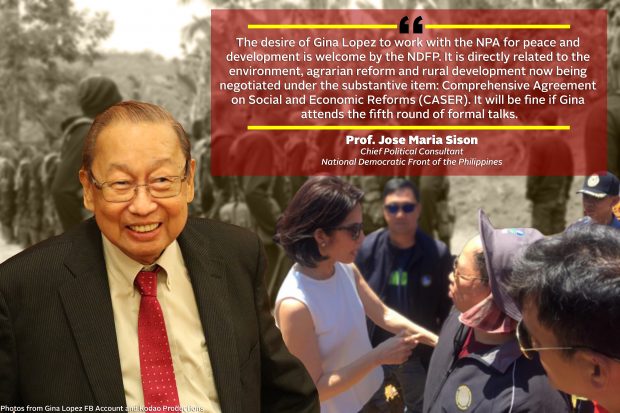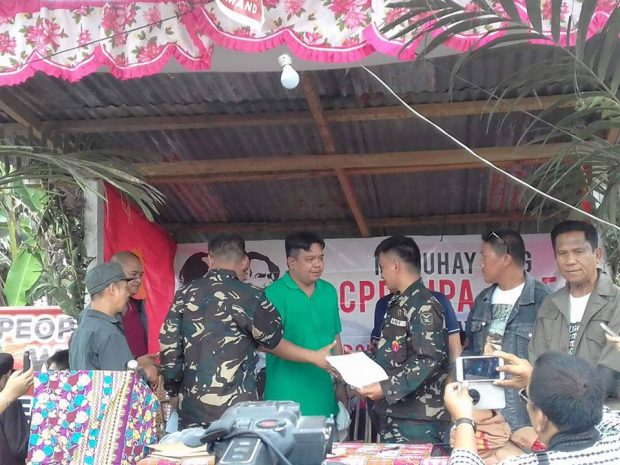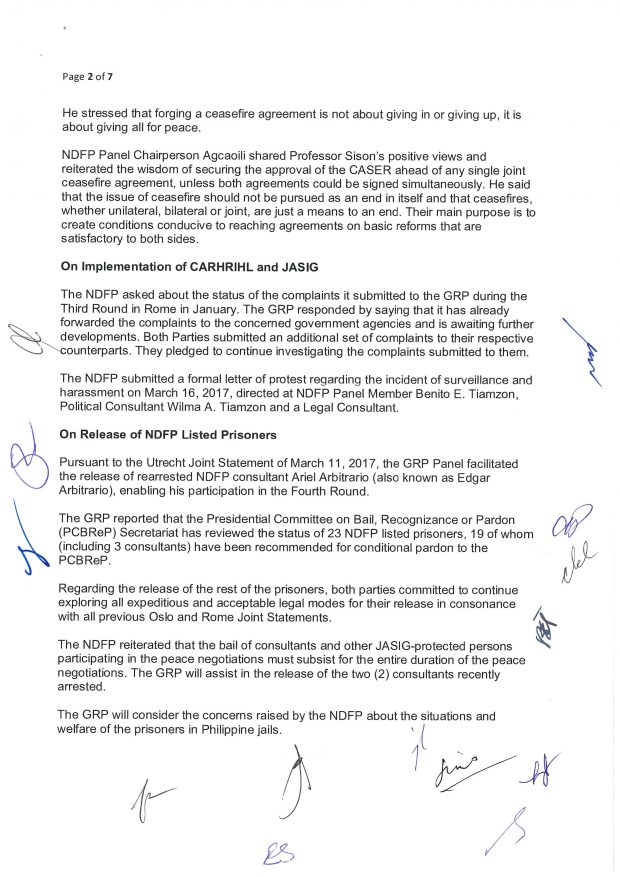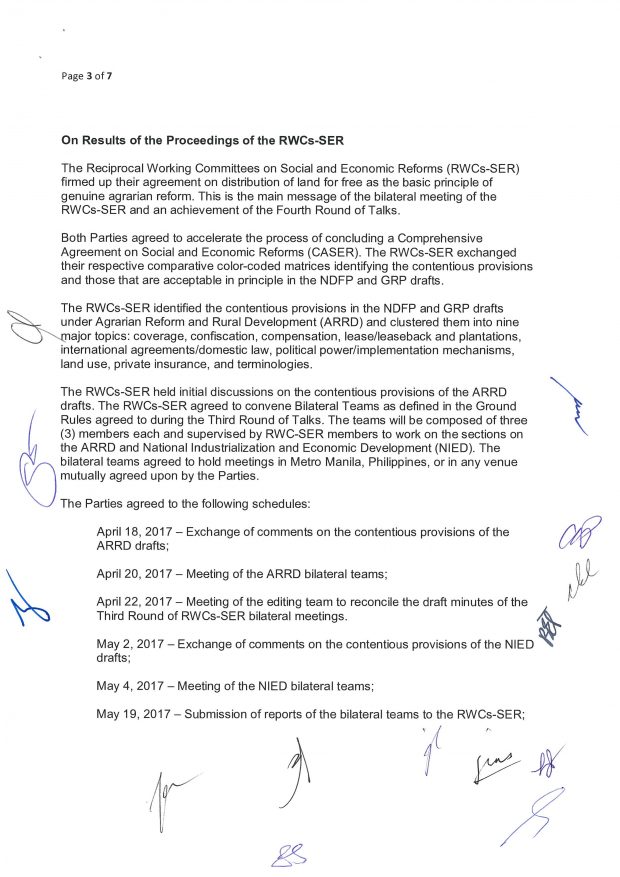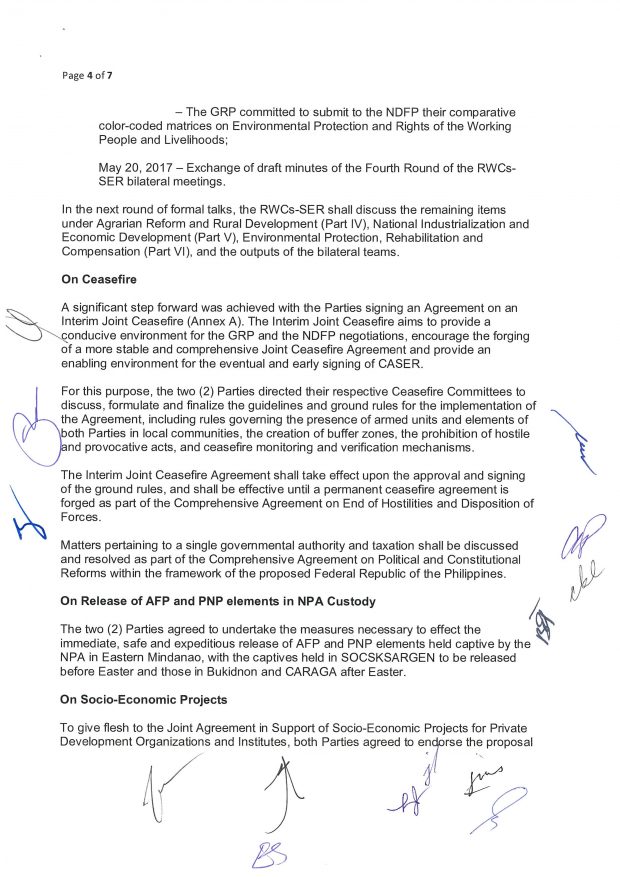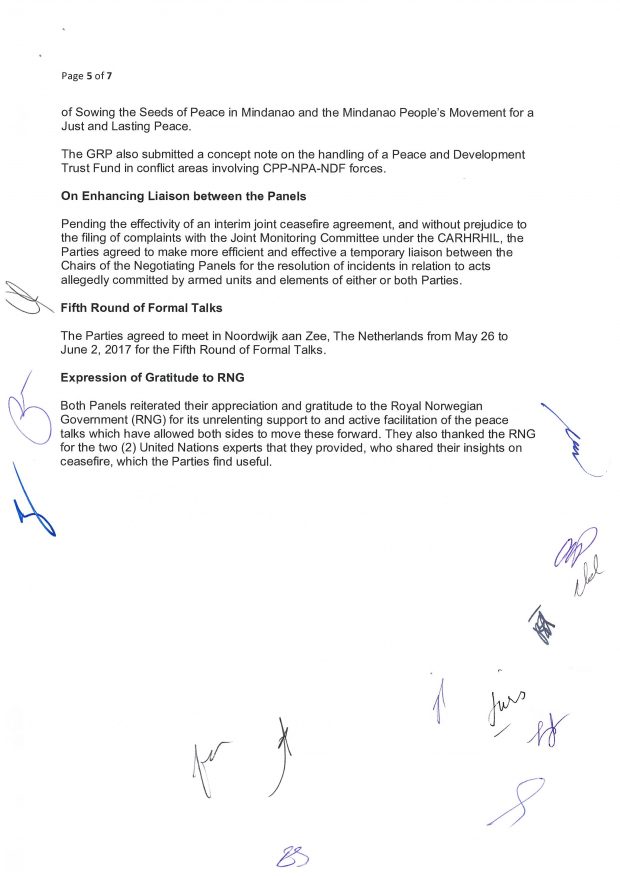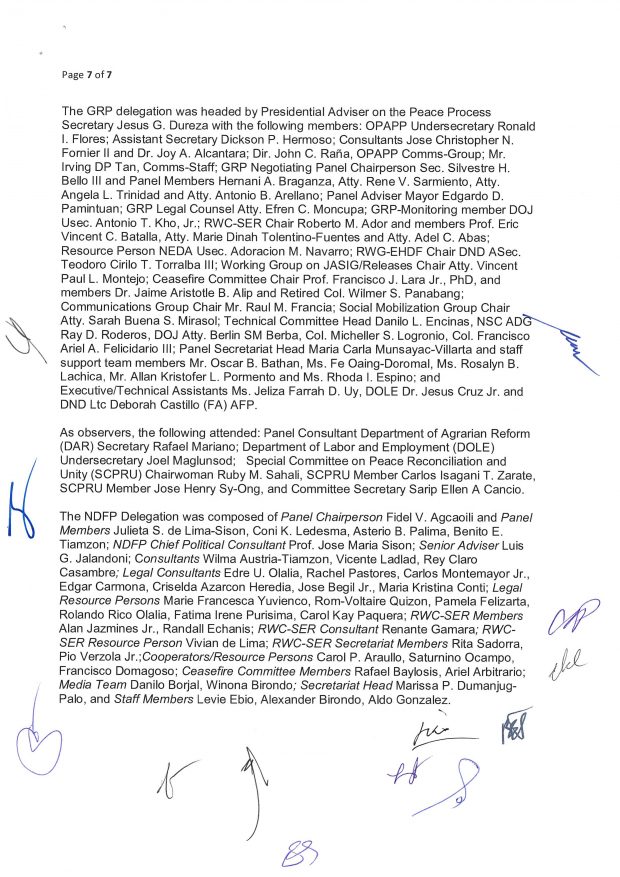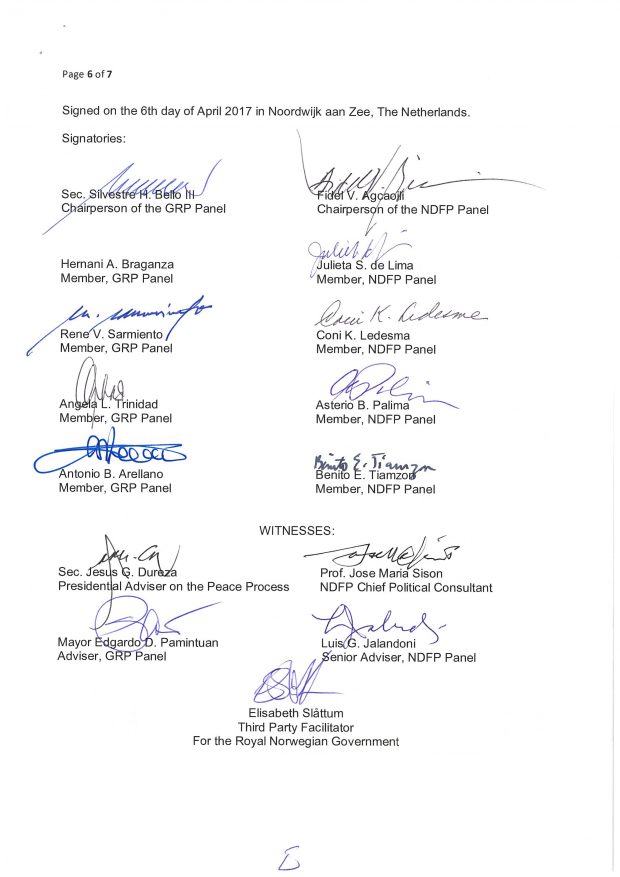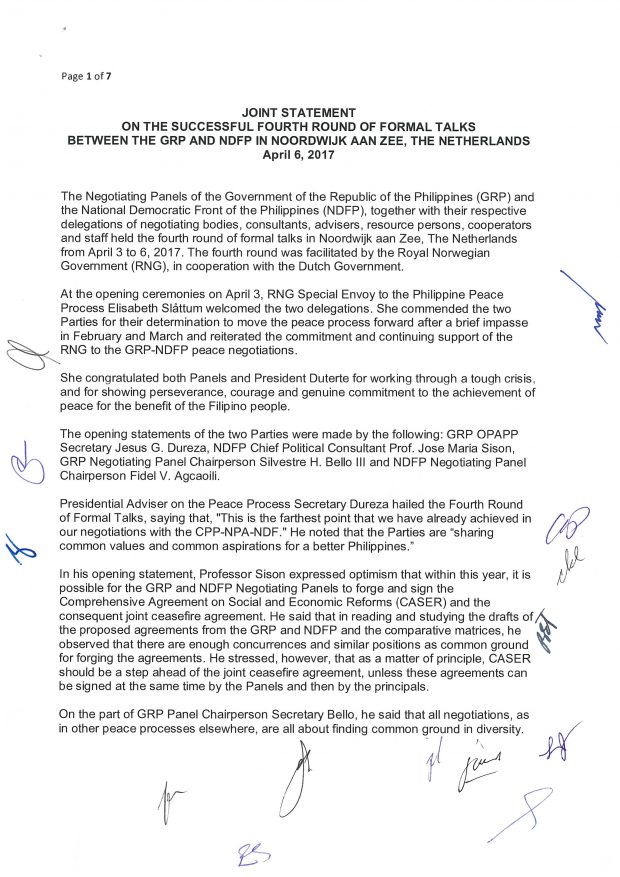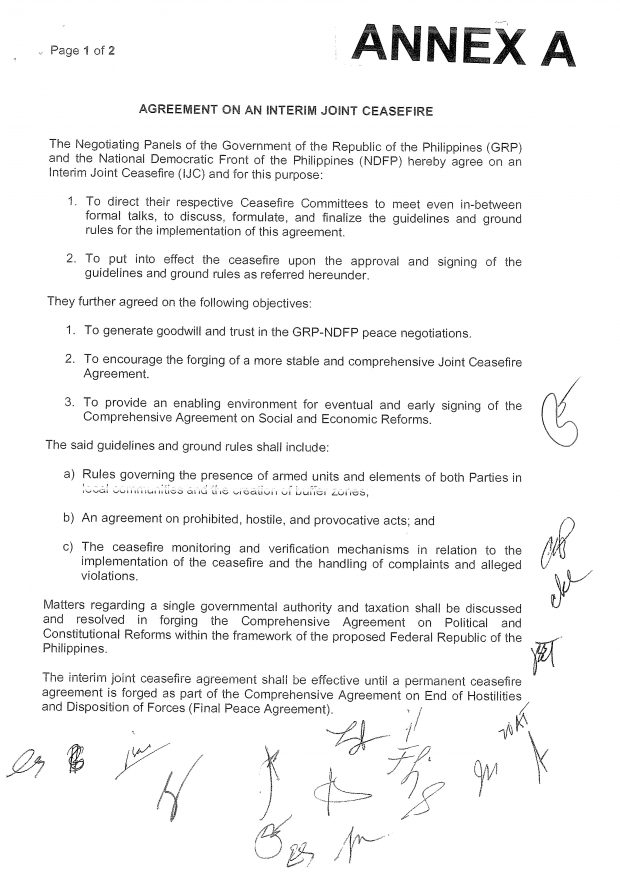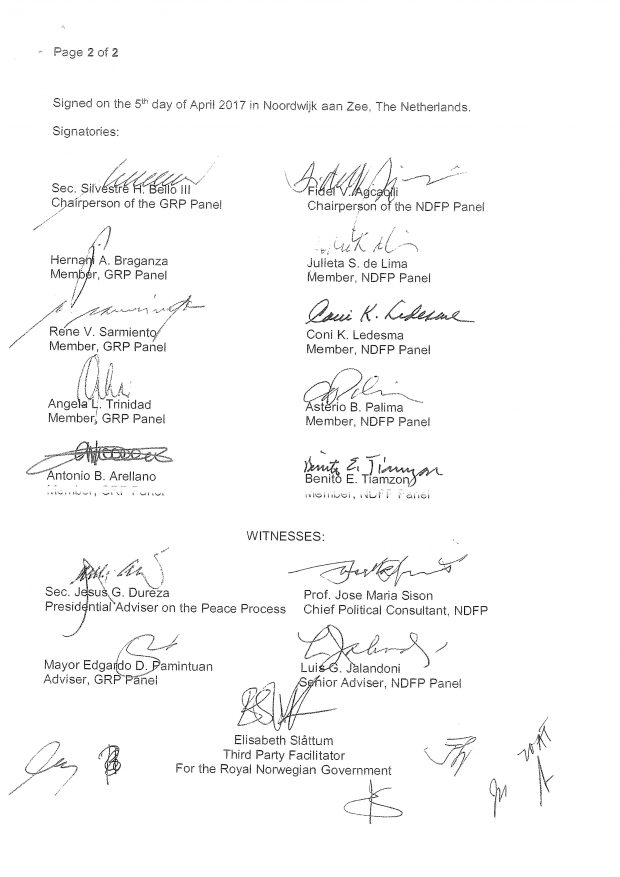By Carol P. Araullo
The fourth round of formal peace talks between the Government of the Republic of the Philippines (GRP) and the National Democratic Front of the Philippines (NDFP) got off to a halting start last April 3, a full day after the scheduled formal opening. For a while, it was unclear whether the talks would open at all or just fizzle out unceremoniously leaving both sides frustratingly empty handed.
In truth, dark clouds remained despite the breakthrough achieved in the March 10-11 informal talks wherein the two sides agreed that the fourth round would resume in The Netherlands and that the simultaneous unilateral ceasefires of the two Parties would be reinstated.
For one, the GRP did not declare anew its unilateral ceasefire in contravention of the GRP-NDFP March 11 Joint Statement. This prompted the NDFP to withhold its own unilateral ceasefire despite a public announcement that it would declare one before the beginning of the fourth round.
Consequently, the GRP principal, President Rodrigo Duterte, announced four conditions for the GRP’s returning to the talks with the NDFP: 1) a signed bilateral ceasefire agreement; 2) that the revolutionary movement desist from claiming any territory; 3) a stop to the collection of “revolutionary taxes”; 4) release of all the soldiers, policemen and others held captive by the New People’s Army (NPA).
A few days before the formal talks, Defense Secretary Lorenzana issued a vitriolic statement labelling the CPP-NPA-NDFP as “terrorists” and declaring ex cathedra (“With the full authority of office”—Ed.) that the talks would not happen unless the NPA complies with Duterte’s conditions.
Only after getting a firm assurance from the NDFP peace panel that an interim joint ceasefire agreement would be in the agenda of the formal talks did Mr. Duterte give the definitive green light to the formal opening. The matter of ceasefire became the de facto primary item on the agenda of the fourth round. An inordinate amount of time and shuttling back and forth between the two sides eventually produced the Agreement on an Interim Joint Ceasefire.
What does the agreement amount to? For one, it does not mean that a bilateral ceasefire is already in place. It does not even mandate the two Parties to declare the restoration of their respective unilateral ceasefires. It does however bind them “(to) direct their respective Ceasefire Committees to meet even in-between formal talks to discuss, formulate and finalize the guidelines and ground rules for the implementation of this agreement.”
In other words, the Parties agree to forge the interim joint ceasefire in the near future by hammering out the ground rules and guidelines governing the aforesaid ceasefire. But while it is not explicitly stated, the NDFP has made it exceedingly clear that such a bilateral ceasefire can only be signed consequent to or simultaneous with the signing of the Comprehensive Agreement on Socio-economic Reforms (CASER). Otherwise, the NDFP fears, with due cause, that the GRP will no longer be impelled to address the root causes of the armed conflict with needed social, economic and political reforms.
As of today, sans a return to the simultaneous unilateral ceasefires, the mode is “talking while fighting”.
But once in place, the interim joint ceasefire is a prospective advance on the previous five-month unilateral ceasefires declared by the two sides. The latter are by nature generally more unstable because of the absence of bilaterally agreed terms of reference like buffer zones and zones of safety, hostile acts and the like; that is, each side can set the parameters for a unilateral ceasefire according to its own political and military imperatives thereby blunting or forestalling possible complaints of violations of the ceasefire.
Concretely, while armed clashes between the Armed Forces of the Philippines (AFP) and the NPA went down drastically, the AFP continued to militarize the countryside. The AFP set up encampments in schools and other civilian infrastructure in the barrios; conducted intelligence and psywar (psychological warfare) operations disguised as “peace and development” operations including anti-illicit drugs and other anti-crime operations; provided security for big mining operations and plantations; as well as penetrated deep into territory where the NPA forces have established a shadow form of government.
The interim joint ceasefire agreement is different from and “shall be effective until a permanent ceasefire agreement is forged as part of the Comprehensive Agreement on End of Hostilities and Disposition of Forces (Final Peace Agreement).” It should therefore not be mistaken for the end point of the peace negotiations.
What of the matter of claimed NDFP territory and revolutionary taxation that President Duterte so roundly denounced as unacceptable? With much flexibility and skillful language engineering by the negotiating panels, the sticky points were relegated for discussion and resolution to negotiations on political and constitutional reforms as “matters of a single governmental authority and taxation” and “within the framework of the proposed Federal Republic of the Philippines”.
All in all the Reciprocal Working Committees on Socio-economic Reforms (RWC-SER) met and held discussions bilaterally for only a total of some six to seven hours during the four-day formal talks. As validated by unofficial explanations from the GRP side, negotiations on CASER could not substantially proceed whilst an agreement on a joint ceasefire had not been signed. In a manner of speaking, the talks on CASER were effectively preconditioned and held hostage to the inking of a ceasefire agreement acceptable to Mr. Duterte.
Having said that, it is noteworthy that the Parties “firmed up their agreement on distribution of land for free as the basic principle of genuine agrarian reform.” This achievement is a solidification of the breakthrough reached in the third round of talks in Rome. It was overshadowed and almost went unnoticed due to the resumption of armed hostilities between the AFP and NPA almost immediately with Mr. Duterte’s declaration of “all-out war” against the CPP-NPA-NDF.
They also agreed to speed up the pace of exchanging drafts, identifying contentious points and proposing formulations that are deemed to be acceptable to both Parties. In this regard, bilateral teams under the supervision of their respective RWC-SER are to meet in between formal talks prioritizing Agrarian Reform and Rural Development (ARRD) and National Industrialization and Economic Development (NIED). A work schedule was approved in sync with the fifth round of talks slated to take place once more in The Netherlands from May 26 to June 2.
If one were to assess simply and forthrightly what was achieved in the fourth round of talks, it is this: that the GRP-NDFP peace talks have been brought back on track and successfully concluded with positive outcomes despite all the efforts of peace spoilers to sabotage and torpedo them.
As much as the GRP and NDFP panels and their principals, the RNG Third Party Facilitator deserves credit for having exerted extra effort to help bring the Parties back to the negotiating table.
Royal Norwegian Government Special Envoy to the Philippine Peace Process Elisabeth Slattum succinctly put it in her opening statement, that the fourth round pushed through as agreed upon last January shows the Parties’ determination and capacity to surmount obstacles, break the short impasse in February and March and move the peace process forward. #
First published in BusinessWorld
10 April 2017

